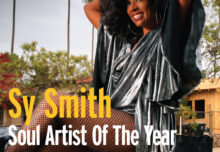AUGUST 2024 ISSUE
A sneaky peek of just some of what is in the August 2024 issue – OUT NOW!
JAKE ISAAC
Some of you might not know it but Jake Isaac is about to release the fourth album of his career. The excellent Benjamin will arrive in October – following on from the success of singles such as Good Man [recently A-listed on Radio 2] and the Bill Withers-ish Black Or White, just out – though perhaps if, like me, you’ve heretofore been blissfully unaware of Our Lives [2017], Honesty [2021] and even last year’s For When It Hurts, it may feel like witnessing the debut of a guy you’ve somehow never really noticed before.
And that’s because while we over here in Soulworld have been looking [and listening] in one direction, South-London born-and-raised Jake has been travelling towards us on an unexpected trajectory, like a previously uncharted comet heading relentlessly on its path. For, despite his church background – his dad is a pastor – when Jake took up first drums, then bass, then keyboards, his attraction to and natural facility for musical genres beyond gospel, soul and R&B led him to explore artistic pastures outside the scope of what we’re usually about here.
When you hear it, though, you’ll know: yes, there are flavours of folk, pop, rock and more stirred into his creative pot, but Jake Isaac is all about soul music.
ETANA
Reggae fans and commentators were always remarking how male artists heavily outnumbered their female counterparts. This is still true, even though there are now more women representing reggae and dancehall than ever before. Sadly, many of them aren’t lauded for their skills but tend to attract attention because of their looks, overt sexuality or spats with rivals. This means that they’re not always afforded the same levels of seriousness as male artists, but there are exceptions.
Etana, who doesn’t denigrate herself in any way, has fought long and hard for her independence. As a result, she’s often accused of being a troublemaker by those who want to keep her down and exploit her talent. Yet as her name suggests – Etana means “strong one” in Swahili – she’s fully determined to carve her own path in the music business, and on her own terms wherever possible.
Her ongoing battle with VP Records has been all over social media for months and has already succeeded in influencing a number of other artists to explore the pros and cons of running their own labels, or to look elsewhere in their search for dedicated business partners.
“Doing it myself makes it easier because there are many different platforms that you can upload the music to… “
CORNELL 'C.C.' CARTER
Ralph Tee, joint honcho [with Richard Searling] at Expansion Records, knows what I like. Which is why, ahead of the release of Cornell ‘C.C.’ Carter’s new album, Expressions Of Soul, he sent me the track Are You Alone, a fine soul ballad in the tradition of Bobby Womack. He just knew I wouldn’t be able to resist it.
So, when, a couple of weeks later, C.C. and I sit down in the garden of an Essex pub to discuss the man’s adventures over the past three years since Next Life, the album he released just after lockdown, said song is an obvious place to begin. And C.C. is clearly amused by the trap that had been set.
“Ha! Yeah, he was very clear about you: he said you were a tough nut to crack sometimes. Personally, I appreciate that – I want the listener to be tough. And if it doesn’t move you, it doesn’t move you. What can you do?
“With Are You Alone, though, when I first wrote it, it was sort of a different story. But my daughter was going through some things with a relationship at the time – she’d been with somebody I didn’t think was necessarily good for her – so the story switched to hers. It turned into father talking to his daughter. She’s aware of all this, by the way. And at the same time, there’s a huge loneliness out there in general, man.”
JAH THOMAS
The title of Acid Jazz’s new Jah Thomas compilation The Music Maker From Jamaica says it all. Between 1978 and 1983, the deejay from West Kingston voiced and produced some of the biggest hits of the early dancehall era, and by artists such as Tristan Palmer, Anthony Johnson, Little John and Barry Brown, as well as himself.
Early dancehall differed from rockers reggae – as defined by Rasta icons such as Bob Marley and Peter Tosh – in several important ways. In the first instance [and just as the name suggests] it was birthed in dances held throughout the island, most of which took place in open air spaces, as opposed to clubs or theatres. Whilst musicians still formed groups and the leading studios all had house bands, a lot of the records produced in the late seventies weren’t standalone compositions but were voiced on pre-existing rhythm tracks. They were versions, rather than one-off originals, whilst the artists themselves didn’t hone their craft so much on stage shows, but sound systems. The history of that period is rife with stories of producers like Jah Thomas or his close friend Henry “Junjo” Lawes hearing an artist letting off lyrics in a dance, and then rushing them into the studio to record it as their entourage excitedly beat on the studio walls. This is why there’s a freshness to so many early dancehall records.





